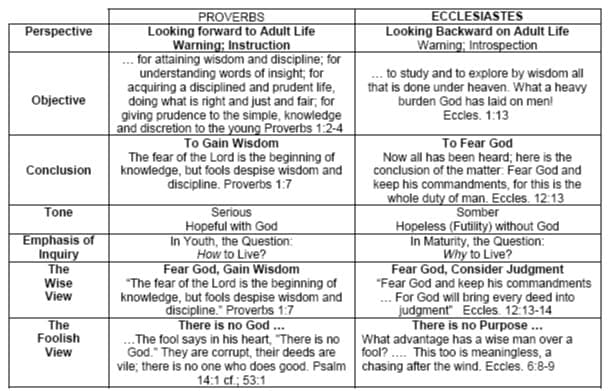Wisdom Wednesday : Wisdom of Solomon – Part 6
Solomon’s Philosophy
Submitted by Debbie’s Dad
“Vanity of vanities,” says the Preacher,
“Vanity of vanities! All is vanity.” (Ecclesiastes 1:21) NASB 95
“Futile! Futile!” laments the Teacher.
“Absolutely futile! Everything is futile!” (Ecclesiastes 1:21) NET
Solomon authored the philosophical book of Ecclesiastes, as indicated by the specific references in the text, including: 1) Eccl. 1:1 indicates Qohelet is the son of David, 2) Eccl. 2:9 describes the author as greatest in Jerusalem and numerous other references detail the wealth and wisdom attributed only to Solomon (see 1:12-2:26), 3) Ecclesiastes 1:12 describes the author as “King … over Israel”
Solomon reigned forty years in Jerusalem over all Israel (2 Chron 9:30) and this book was likely written late in his life as he looked back on life. He developed a philosophical attitude, thinking more abstractly about life and its meaning. While in his early reign, he focused on the particulars of life (nature, the arts, architecture, commerce, leadership and national power) it was in his later years that he pondered the meaning of it all. (Indeed, this is common for all of us as we grow old to look back on life, consider its meaning and ponder our own approaching death.)
Ecclesiastes is unique in the Old Testament because of the seeming contradiction between its message and that of the Psalms, Proverbs and other books of the Old Testament. The recurring theme of the book can be simply paraphrased as Solomon’s observation: “In all of my observations and experiences of life under the sun, I can only conclude that life is empty, without purpose and futile.”
Several terms and phrases are unique and repeated by Solomon in this book:
- Vanity (Hebrew Hebel) is used to express the concept of emptiness, meaninglessness or futility: something transitory or unsatisfying.
- Vanity of vanities – this phrase is used on numerous occasions (1:2, 2:1, 3:19, 4:4, 5:10, 6:9, 12:8,etc.) to describe emptiness in a superlative form, literally, “ the emptiest of emptiness” or “Meaningless!”(NIV translation). This theme of life’s transitory nature is repeated in a warning by James: “Why, you do not even know what will happen tomorrow. What is your life? You are a mist that appears for a little while and then vanishes” (James 4:14).
- Teacher or Preacher (Qohelet)- the author entitles himself by this term which means “one who gathers, collects”…referring to the information observed.
- Under the sun – this phrase is often used to refer to things on earth in human life. The emphasis is temporal life, the brief span between birth and death that man exists as the sun passes over day after day recording the relentless passage of time.
The book is carefully organized into a sequence of observations about life (from the perspective of a man who “had it all”) followed by a conclusion. The four-part outline, with chapters of the book are:
- Introduction: The Thesis that Human Life is Utterly Futile (1:1-11)
- Observations of Life as Proof of the Thesis
- Overview of Observations of Futility (1:12-2:26)
- Demonstrations of futility
- The Sovereignty of God (3)
- Futile Injustices of Life (4)
- Religion and fear of God (5:1-7)
- Futile Results of Wealth (5:8-20)
- Inability to Enjoy the Fruits of Life (6)
III. Preliminary Conclusions
- The Ignorance of Man’s Wisdom (7:1-8:1)
- Injustices of Human Government (8:2-17)
- The Same Destiny for all Men (9:1-12)
- Weaknesses of Wisdom (9:13-10:20)
- Do your Best (11:1-7)
- Final Conclusion: Fear God and Obey
- Recognize God before Old Age (11:8-12:8)
- Fear God and Obey (12:8-12:14)
We can compare the themes of futility (meaninglessness- without purpose) in the book with the issues raised by existential writers and philosophers to understand the underlying search for purpose and meaning in life apart from the existence of God. Solomon addressed the perplexing question – “How do we find meaning when life seems ultimately meaningless?”
What a contrast to the Proverbs, also written by the hand of Solomon! The stunning contrast is summarized in the following table.

In the end, the book makes a weak conclusion that man must “… fear God and keep his
commandments” (12:13-14) to achieve a wholesome life, but without a positive explanation that presents God’s real meaning for man.
Why does the Bible contain a book that makes such statements? It appears to be a contradiction to the very theme of the Bible – that God, in His great wisdom and love, has provided a means of salvation for man from sin, and an eternal purpose of bringing glory to God, forever!
It is likely because in his old age, Solomon departed from the wisdom of his earlier years and relied on his own rational thinking apart from God. The Scripture provides little detail about Solomon’s latter years other than his fall into idolatry (I Kings 11:1-8) in direct violation of the Law (Ex. 20:3 etc.) Nehemiah summarized the greatness of Solomon’s life, the depth of his sin, and the grace of God to permit him to reign: “Was it not because of marriages like these that Solomon king of Israel sinned? Among the many nations there was no king like him. He was loved by his God, and God made him king over all Israel, but even he was led into sin by foreign women” (Neh. 13:26).
This is the great value of Ecclesiastes – it gives us a sad view of the philosophical perspective of life apart from a loving God Who offers redemption from sin and the hope of eternal life. It exposes